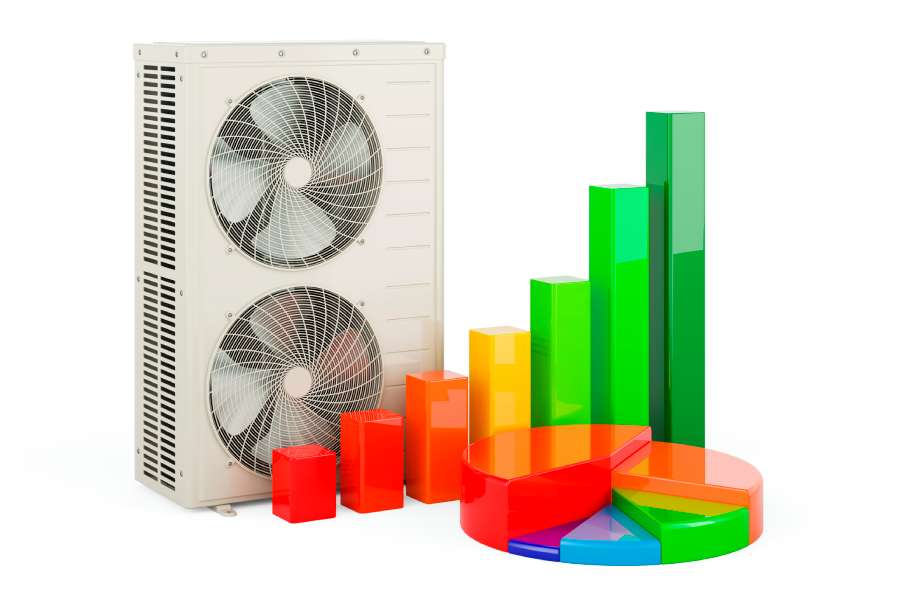The HVAC service and technology are dynamically evolving, and in 2024, it will be no different. As we step into the future, the HVAC industry is anticipated to undergo significant transformations.
From cutting-edge innovations to sustainability efforts, here’s a comprehensive guide to the top HVAC trends in the market.
1. Smart HVAC Systems
Even before 2024, smart thermostat systems have gained immense popularity owing to their numerous advantages. These systems are designed to be much more than just a luxury, as they are now becoming a standard feature in modern homes and commercial buildings.
With the help of AI and machine learning, these intelligent HVAC systems can optimize energy consumption, thereby providing a comfortable environment while reducing costs.
With AI-powered HVAC systems, homeowners can monitor indoor and outdoor temperature, humidity, and air quality to adjust the temperature and ventilation settings accordingly. By analyzing these variables, the system can learn the occupants’ preferences and adjust the temperature and airflow to suit their needs.
Overall, the integration of AI and machine learning is paving the way for a smarter means of managing HVAC systems.
2. Energy Efficient Air Conditioning
We’re in an age of heightened environmental consciousness. So, it is not unexpected that industries, including HVAC, have taken steps to adopt practices and technologies that help minimize environmental impact and promote energy efficiency through renewable energy sources.
Here is an overview of the most innovative energy-efficient HVAC technologies that are expected to emerge in 2024.
- Variable-Speed Compressors
HVAC systems with variable-speed compressors can adjust the speed of the compressor motor based on the heating or cooling needs of a space. It results in better energy efficiency as the system doesn’t constantly run at full capacity, saving energy and reducing utility costs.
- Eco-Friendly Refrigerants
The HVAC industry is increasingly adopting refrigerants that have a lower environmental impact, reducing greenhouse gas emissions. This shift toward eco-friendly refrigerants contributes to sustainable practices and aligns with global environmental initiatives.
- Green HVAC Company Initiatives
A reliable HVAC company becomes so much more the moment it starts taking comprehensive initiatives to operate in an environmentally responsible manner. It includes adopting energy-efficient practices, using sustainable materials, and investing in technologies that reduce the overall carbon footprint of HVAC units.
3. IoT Integration in Air Conditioning
The expansion of Internet of Things (IoT) technology has brought about a significant change in the way we manage our daily lives, and air conditioning systems are no exception. By integrating IoT technology, air conditioning systems have become smarter, more efficient, and easier to manage.
With IoT-enabled controls, monitoring, and maintenance, HVAC equipment can perform seamlessly, ensuring optimal performance and comfort. From real-time monitoring of temperature and humidity levels to predictive maintenance alerts, IoT integration has transformed the air conditioning industry.
4. Solar-Powered Cooling Solutions
Solar-powered systems typically involve the use of solar panels to generate electricity, which is then used to power cooling units such as air conditioners or refrigeration systems. The benefits of solar-powered cooling solutions include reduced energy costs, lower carbon emissions, and increased self-sufficiency.
Additionally, these systems can be particularly useful in areas where access to traditional energy sources is limited or unreliable, such as in remote or off-grid locations. Overall, solar-powered cooling solutions represent an innovative and sustainable approach to meeting our cooling needs while tying back to the second trend in this list: sustainability.
5. Improved Air Quality Management
As people become more aware of the importance of indoor air quality, the HVAC market is making significant strides toward incorporating advanced filtration and purification technologies into its products.
These new developments are designed to improve the air quality in homes and buildings, which in turn contributes to healthier indoor environments. By removing harmful pollutants and toxins from the air, these technologies are helping to create a safer and more comfortable living and working environment for people everywhere.
6. Adaptive Climate Control Systems
Adaptive Climate Control Systems are advanced technologies that are designed to automatically adjust the temperature, humidity, and airflow in indoor environments to create a comfortable and healthy living or working environment.
These systems can be integrated with various sensors and algorithms to monitor and analyze indoor climate conditions and then adjust the heating, cooling, and ventilation systems accordingly. Adaptive Climate Control Systems are becoming increasingly popular in modern buildings, as they offer significant energy savings and improved indoor comfort and air quality.
7. Voice-Activated HVAC Systems
Voice-activated HVAC systems are becoming increasingly popular thanks to their ability to be controlled using voice commands. These systems employ an advanced blend of artificial intelligence and natural language processing technology, allowing them to comprehend and respond to spoken instructions from the user.
The advantages of voice-activated HVAC systems are numerous, including heightened convenience, improved energy efficiency, and a reduction in the requirement for physical controls, such as thermostats and remote controls.
With these systems, users have the freedom to manage their HVAC system without the need to get up from their seats, providing an unparalleled level of comfort and ease of use. Additionally, voice-activated HVAC systems aid in the reduction of energy waste by tailoring the system’s usage to the user’s needs, resulting in more efficient and cost-effective heating and cooling.
8. Compact and Aesthetic HVAC Designs
Compact HVAC designs are particularly useful in buildings with limited space for installation. They are engineered to occupy less space while providing the same level of performance as their larger counterparts.
Aesthetic HVAC designs, on the other hand, are designed to blend in with the building’s decor and architecture. They can be customized to suit the specific style and color scheme of the space, making them an attractive addition to any building.
Compact and aesthetic HVAC designs offer a practical and visually pleasing solution for modern buildings with space constraints.
9. Remote Monitoring and Control
The trend of remote monitoring and control of HVAC systems is on the rise in our ever-evolving digital world. With the growing importance of connectivity, air-conditioning systems can now be monitored by your chosen HVAC service provider and supervised remotely to ensure their optimal functioning.
This approach offers several benefits, including improved energy efficiency, reduced operational costs, and enhanced comfort levels for users. As a result, remote monitoring and control have become a significant aspect of modern HVAC systems, enabling facility managers to monitor and adjust system performance from a remote location.
10. Augmented Reality in HVAC Maintenance
Augmented Reality (AR) technology has emerged as a game-changer in the field of HVAC maintenance. With the help of AR applications, technicians can now perform diagnostics, repairs, and maintenance tasks with unprecedented accuracy and efficiency.
By superimposing digital information and virtual objects onto the real-world environment, AR empowers technicians to visualize complex HVAC systems and identify issues with greater ease and precision. It not only streamlines the overall service process but also reduces the risk of errors and improves the quality of service.
Final Takeaways
As we move towards 2024, the HVAC industry is leading the way in innovation. From smart systems to sustainable practices, the discussed trends provide a glimpse into the future of air conditioning technology.
It is important to note that the installation, repair, and management of new HVAC technology will require professional HVAC service providers. It is important to only choose an expert HVAC company that keeps up with these industry trends to maximize the benefits of your air conditioning system.



